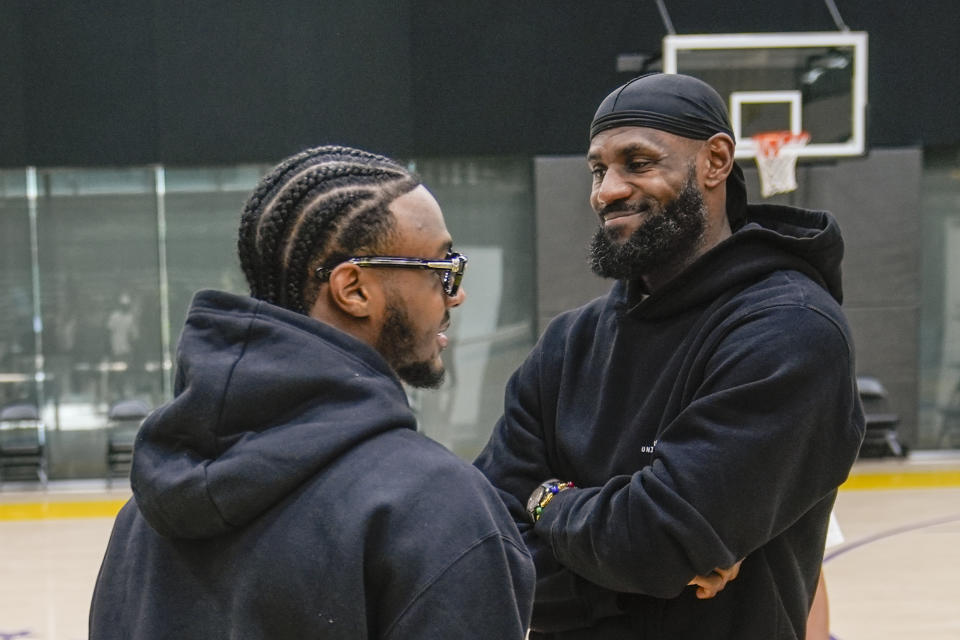To some, it might appear as if the Los Angeles Lakers should hang a banner that reads “Mission Accomplished” for their 2024 summer.
After all, they hired JJ Redick as their new head coach and drafted Bronny James, the son of a certain LeBron, which was what most Lakers fans seemed to be the most interested in.
(They should be far more excited about Dalton Knecht, who the Lakers snatched at No. 17 in the NBA Draft, but that’s a story for a different day.)
The mission, however, isn’t quite accomplished, even after both of the Jameses locked up new contracts, with LeBron reportedly agreeing to a $104 million deal, which will run over two seasons, and Bronny signing for $7.9 million over four years.
As it stands, the Lakers’ roster remains unfinished, or at least uncalibrated, with the team closing in on second apron territory, which would further limit their transaction maneuverability going forward.
So, let’s take a look at their situation.
It was reported by Adrian Wojnarowski that LeBron would perhaps be willing to take $1 million less in salary for the Lakers to avoid going over the second apron.
As currently constructed, the Lakers aren’t hard-capped, meaning they can in theory go over the second apron by re-signing their own players.
That isn’t their plan, however.
By not being hard-capped yet, the Lakers have one bullet left in the chamber to upgrade their roster, and will need to use it wisely.
If they aggregate salary, they are not allowed to take back more money. They are, however, allowed to take back less, but that will hard-cap them at the second apron, meaning they cannot possibly exceed it for any reason.
That brings D’Angelo Russell, Rui Hachimura, Jared Vanderbilt and Gabe Vincent to the party.
If the Lakers can consolidate some of those contracts and get back one superior player who is paid less than the combined salary the Lakers send out, that will result in three things:
-
They get another key player into their fold, presumably helping them in their efforts to go far in the playoffs.
-
They get hard-capped at the second apron.
-
By taking back less salary, they provide themselves with some level of wiggle room under their now hard-capped second apron, making it inconsequential that they’ve been hard-capped.
Sounds almost too good to be true, right?
Except, this comes at a price.
As a hypothetical, let’s say the Lakers zero in on Cam Johnson in Brooklyn, who is earning $23.6 million this year.
They offer the Nets Russell and Vanderbilt, sending out $29.4 million, and take back Johnson and Noah Clowney, for a combined total of $26.8 million.
Due to how little wiggle room the Lakers have, and knowing this is essentially the sole avenue of upgrading their roster, Brooklyn — and other teams the Lakers engage in trade conversations — would unquestionably try to squeeze them for as many draft selections as possible, both to align trade value, but also to take advantage of the situation.
Furthermore, any team that trades with the Lakers, and takes back more salary than they send out, will be hard-capped. This, too, will influence what teams would like in return in a possible trade.
Then there are the teams that simply do not wish to crack the luxury tax, such as the Chicago Bulls, the latest employer of DeMar DeRozan, who is from Compton and has flirted with the Lakers before.
DeRozan has never been uninteresting to the Lakers. But the avenue to acquire him is difficult to say the least.
Even if the Lakers were able to dump enough contracts to open up the non-tax MLE, DeRozan is unlikely to accept a deal that starts at roughly $13 million.
The Lakers could offer him far more money in a sign-and-trade scenario, but that would require them to send out salary that will force the Bulls into the luxury tax — a place they insist they won’t go.
Now, Los Angeles could try to get a third team involved to absorb a significant amount of the outgoing contracts, but any team absorbing any of Los Angeles’ deals will ask for draft compensation to help them out, and rightly so. The Bulls would also ask to be compensated for their role in dealing DeRozan away.
It should also be noted that using the non-tax MLE, or conducting the above sign-and-trade, would hard-cap the Lakers at the first apron, not the second, necessitating further dumping of contracts.
Ultimately, this is the price the Lakers will have to pay if they wish to make further upgrades, and it’s the complicated path they must walk to get better.
Now the question becomes: Are the Lakers prepared to relinquish future assets to get better this season, even if they were to overcome the above set of challenges?
Only Rob Pelinka, VP of basketball operations with the Lakers, can answer that. But they should be, if they wish to be competitive this season.
LeBron is turning 40 later this year. Anthony Davis is 31. They got beat in the first round of the playoffs just a few months ago, hoping to redeem themselves this season.
It’s probably fair to assume they aren’t thinking long-term at this stage, knowing full well there’s an expiration date on this team.
So whoever they go for, be that Johnson in Brooklyn, DeRozan in Chicago, or even Jerami Grant in Portland, this summer is the time to strike, and probably before teams round out their roster, and lean right up against luxury tax, or aprons.
To strike however, as outlined above, requires immense creativity. The Lakers can ultimately get there with some players, allowing themselves to hang the aforementioned banner. But it’ll be difficult.
EMEA Tribune is not involved in this news article, it is taken from our partners and or from the News Agencies. Copyright and Credit go to the News Agencies, email news@emeatribune.com Follow our WhatsApp verified Channel





